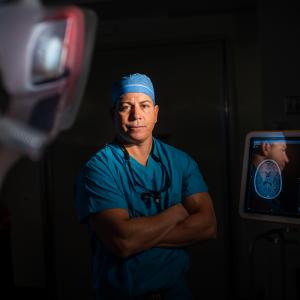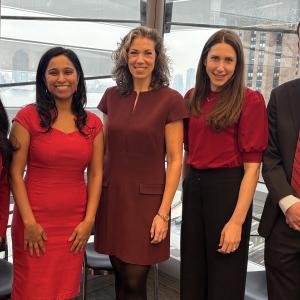
Alma and Malik Membreno, photographed at Halls Pond Park in West Hempstead, Long Island. Malik was diagnosed with a rare pediatric cancer in utero—the same disease his mother was treated for at NYU Langone during childhood.
Credit: Jonathan Kozowyk
When Malik Membreno was born on July 29, 2021, at NYU Langone Hospital—Long Island, his pediatric cancer care team was poised for action. They’d been preparing for this moment for weeks—ever since an ultrasound at Alma Membreno’s 32-week prenatal visit revealed a mass on one of Malik’s adrenal glands. Alma’s obstetrician at another hospital suspected it was neuroblastoma, a rare pediatric cancer that affects about 800 patients each year in the United States. She had good reason to think so: Alma had been treated for the same disease when she was 2.
“When I found out what it was, a tear rolled down my cheek, thinking about what Malik might go through,” says Alma, 25, a single mom who lives in West Hempstead, Long Island.
The diagnosis was agonizing, but the choice of where Malik would be treated was easy. As a child, Alma had undergone surgery and chemotherapy for the same disease at NYU Langone Cancer Center for Kids—Mineola. The center is renowned for treating a wide variety of pediatric cancers and blood disorders, pairing compassionate care with multidisciplinary expertise. “My own experience made me feel comfortable taking Malik there,” says Alma.
Even more reassuring to Alma was seeing familiar faces from years ago, including Charles Coren, MD, site director for pediatric surgery at NYU Langone Hospital—Long Island, and pediatric hematologist–oncologist Mark E. Weinblatt, MD, chief emeritus of pediatric hematology and oncology. “I was pleased to see not only Alma, but also her mom, Ana, who was relieved to have our team involved,” Dr. Weinblatt says.
For her high-risk pregnancy, Alma switched her care to NYU Langone Hospital—Long Island, meeting with numerous clinicians in preparation for Malik’s aftercare. Neuroblastoma doesn’t always require treatment, but doctors knew the fast-growing tumor, now the size of an apricot, would require some form of intervention.
At birth, Malik cried but no sound came out. Within hours, his breathing became labored, his skin turned bluish, and his tongue quivered. He was rushed to the Neonatal Intensive Care Unit and given supplemental oxygen and a nasal feeding tube to provide proper nutrition. An MRI revealed that the cancer had spread to the base of his skull, pressing on the cranial nerve that controls the tongue and vocal cords.
After conferring with her team, pediatric hematologist–oncologist Sylwia Jasinski, MD, decided to transfer Malik to Hassenfeld Children’s Hospital—34th Street in Manhattan, under the care of pediatric otolaryngologist Megan M. Gaffey, MD. “Hassenfeld Children’s Hospital has exceptional expertise in high-risk ENT surgery among newborns,” says Dr. Gaffey, who sees patients in Long Island and Manhattan.
Once she determined that the tumor wasn’t blocking Malik’s airway, Dr. Gaffey inserted a tube into his trachea to ease his breathing and used tiny instruments to extract a biopsy through his mouth, avoiding a neck incision.
In the end, the team chose chemotherapy as a first-line treatment over surgery. “With a newborn, we try to avoid surgery whenever possible,” Dr. Gaffey says. A catheter was inserted into a vein in Malik’s chest, and on August 5, the 1-week-old patient received his first infusion.
Alma shuttled back and forth to Manhattan each day to be with her son. “She kept her cool throughout this challenging time,” Dr. Jasinski says. “She had real strength, perhaps because she is a survivor herself.”
On August 20, Malik, still on supplemental oxygen and nutrition, was transferred to the pediatric intensive care unit at NYU Langone Hospital—Long Island. Malik’s second round of chemotherapy caused his white blood cell count to plummet, requiring an adjustment to his medications and several blood transfusions. On September 22, after nearly two months in the hospital, Malik was discharged to the home Alma shares with her parents, brother, and aunt. With her family looking after their new addition, Alma was soon able to return to her sales job.
While neuroblastoma is rarely inherited, genetic tests found that both Membreno and Malik have a highly heritable mutation, called ALK, that was unknown back when Membreno was treated. The discovery means that Malik has a higher risk of recurrence of neuroblastoma and other neuroendocrine tumors. He will continue to have follow-up scans and ultrasounds until age 10, but the outlook remains positive. “He is in continued remission, and he is thriving,” says Dr. Jasinski. If his cancer does return, an ALK inhibitor may be available. The drug is currently in phase 2 clinical trials, notes Berrin Monteleone, MD, chief of medical genetics at NYU Langone Hospital—Long Island.
Malik still sees a speech–language pathologist but has made rapid gains in communication since starting childcare. Otherwise, he is a healthy, energetic 3-year-old who loves trains, animals, and playing catch. Alma is grateful for their shared good health and, above all, the exceptional care he received. “NYU Langone has an amazing collection of experts, and they all communicated with each other to figure out the right treatment for my son at the right time,” she says. “Honestly, I wouldn’t change anything.”

